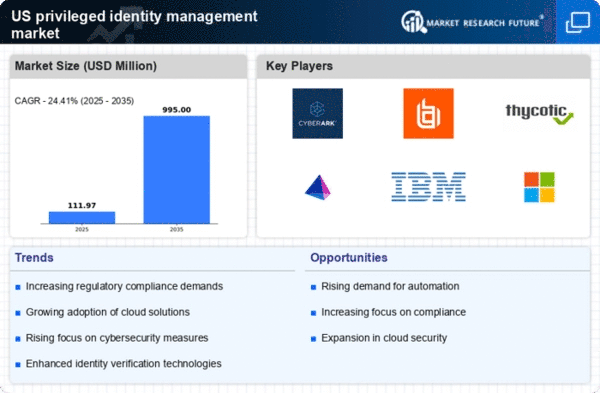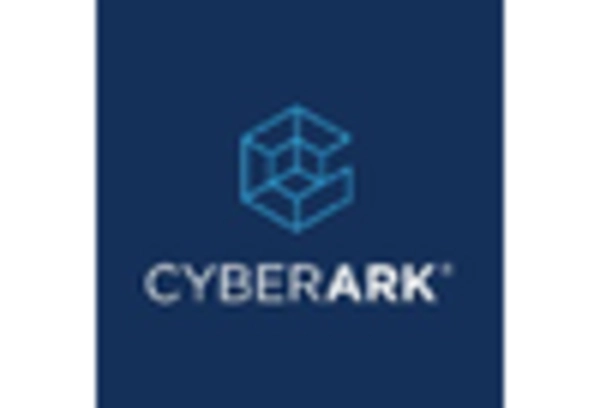Rising Cybersecurity Threats
The privileged identity-management market is experiencing growth due to the increasing frequency and sophistication of cyber threats. Organizations are compelled to adopt robust identity management solutions to safeguard sensitive data and critical systems. In 2025, it is estimated that cybercrime will cost businesses globally over $10 trillion annually, highlighting the urgency for effective security measures. As a result, companies are investing heavily in privileged identity-management solutions to mitigate risks associated with unauthorized access and data breaches. This trend is particularly pronounced in sectors such as finance and healthcare, where regulatory compliance and data protection are paramount. The privileged identity-management market is thus positioned to expand as organizations prioritize security investments to counteract these evolving threats.
Increased Focus on Data Privacy
The privileged identity-management market is being propelled by heightened awareness and concern regarding data privacy. With regulations such as the California Consumer Privacy Act (CCPA) and the General Data Protection Regulation (GDPR) influencing business practices, organizations are compelled to adopt stringent identity management protocols. In 2025, it is anticipated that compliance-related investments will account for approximately 30% of IT budgets, underscoring the importance of privileged identity-management solutions in achieving regulatory compliance. Companies are increasingly recognizing that effective identity management is not only a security measure but also a critical component of their data privacy strategy. This growing emphasis on data protection is likely to drive further investment in the privileged identity-management market.
Expansion of Cloud-Based Services
The privileged identity-management market is experiencing growth due to the increasing adoption of cloud-based services. As organizations migrate to the cloud, they face new challenges in managing user identities and access controls. In 2025, it is projected that over 80% of enterprises will utilize cloud services, creating a pressing need for effective identity management solutions that can operate seamlessly across hybrid environments. This trend is prompting organizations to invest in privileged identity-management systems that can provide centralized control and visibility over user access in cloud environments. The expansion of cloud services is likely to drive innovation and competition within the privileged identity-management market, as vendors develop solutions tailored to meet the unique challenges posed by cloud computing.
Growing Demand for Remote Access Solutions
The shift towards remote work has significantly influenced the privileged identity-management market. As organizations adapt to flexible work environments, the need for secure remote access to sensitive systems has surged. In 2025, it is projected that over 70% of the workforce will engage in remote work at least part-time, necessitating robust identity management solutions to ensure secure access. This trend is driving organizations to implement privileged identity-management systems that can effectively manage user access and monitor activities in real-time. The market is likely to see increased adoption of solutions that provide secure access controls, thereby enhancing overall security posture while accommodating the demands of a distributed workforce.
Technological Advancements in Identity Management
The privileged identity-management market is benefiting from rapid technological advancements that enhance the capabilities of identity management solutions. Innovations such as biometrics, machine learning, and blockchain technology are being integrated into identity management systems, providing organizations with more secure and efficient ways to manage user access. In 2025, the market for biometric authentication is expected to reach $30 billion, indicating a strong trend towards adopting advanced technologies in identity management. These advancements not only improve security but also streamline user experiences, making it easier for organizations to manage privileged accounts. As technology continues to evolve, the privileged identity-management market is likely to expand, driven by the demand for more sophisticated identity management solutions.
















